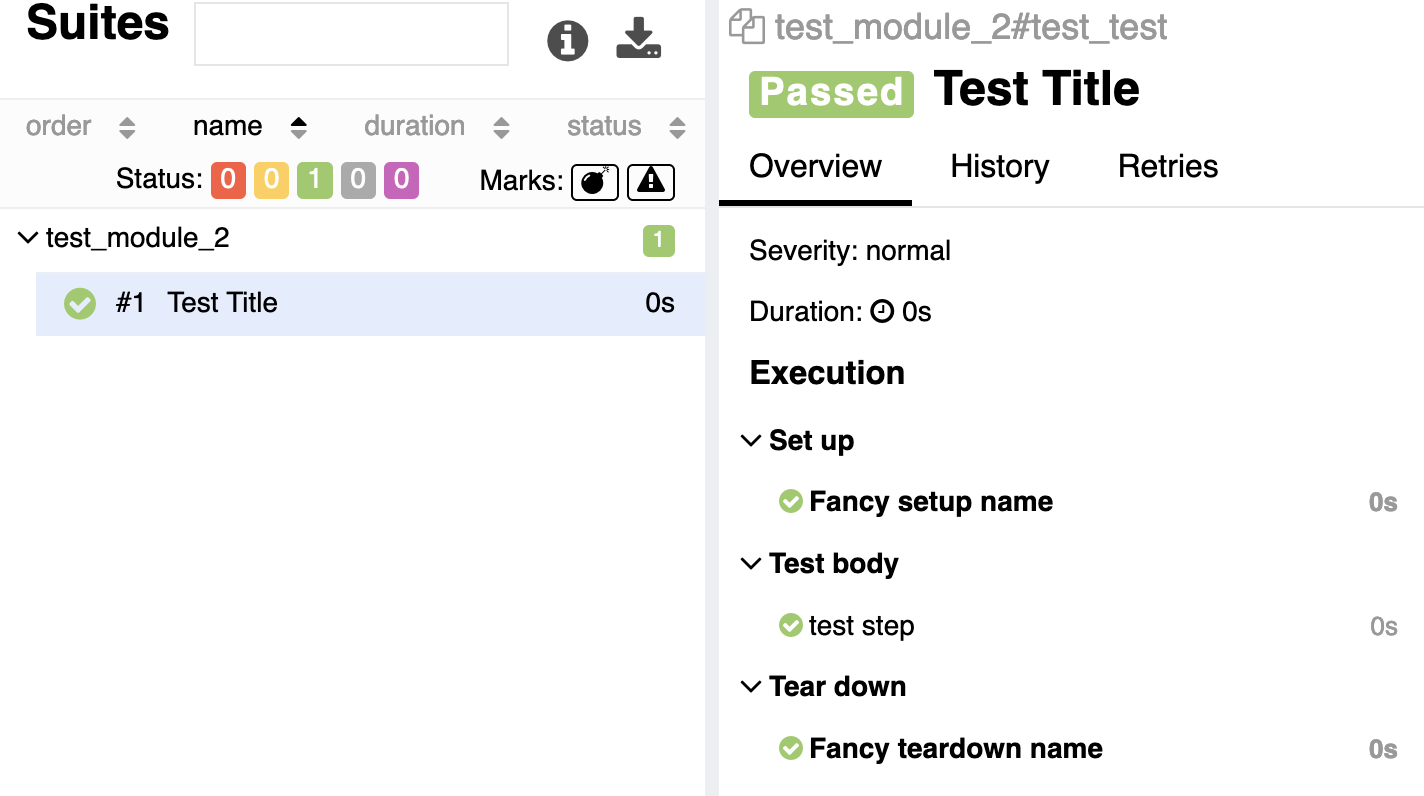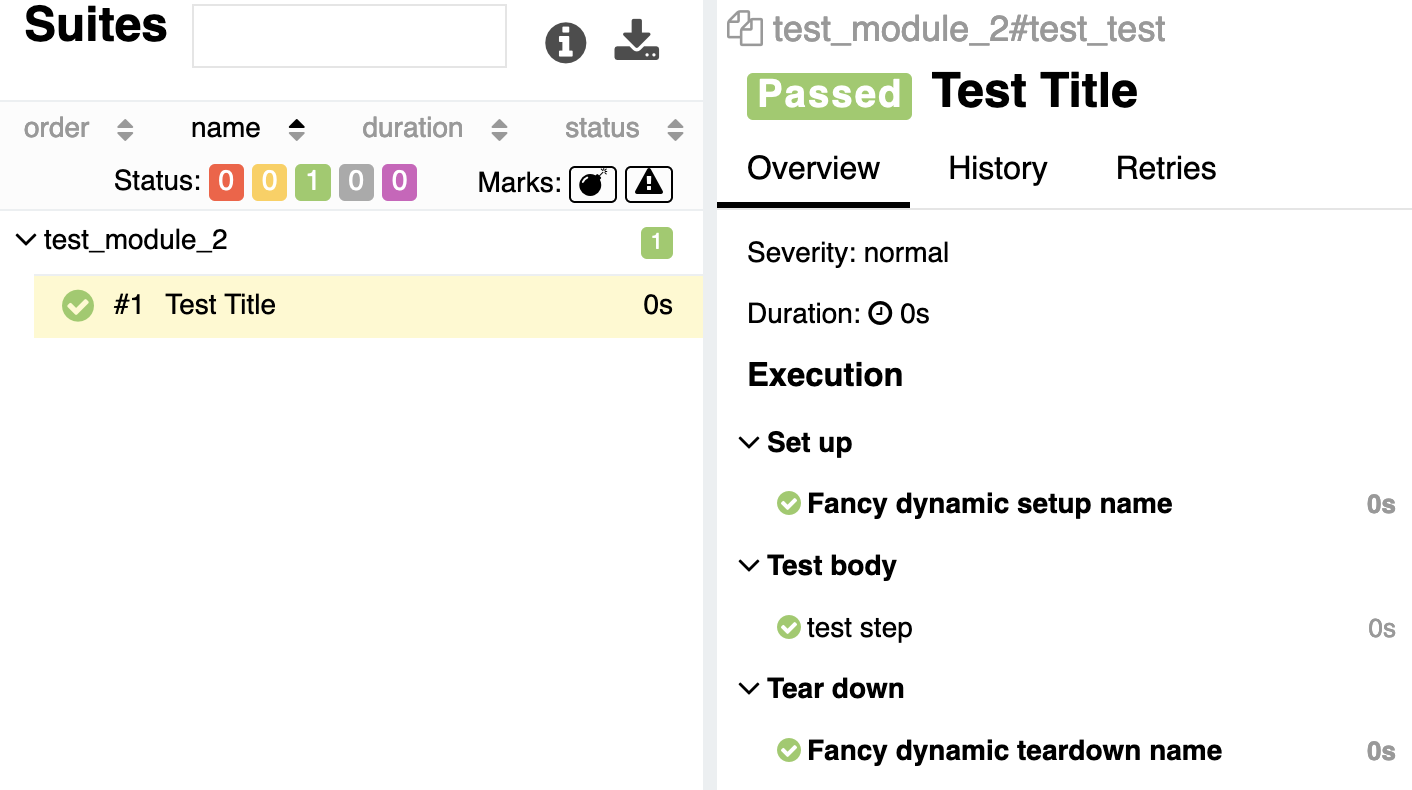pytest plugin extending allure behaviour
- Why has it been created?
- What is it?
- Why is it named "glamor"?
- How to install?
- What does it can?
- Pleasant bonus 🎁
- How can I help?
Just because allure-python plugin accepts PRs very slowly. Sad but true.
I want to inject more functionality into it. That's why I've decided to create this plugin.
As been said it is pytest plugin (tnx captain 😄). Consider this plugin just as some extension for allure-pytest.
Hopefully, they'll see this code and add some of this functionality later.
Because "glamor" is a synonym for "allure". Glamor does the same thing as allure-pytest does but a little more.
The main idea is to just replace imports in you project: instead of import allure you type import glamor as allure and everything works as before.
pip install pytest-glamor-allureThat's it.
It's the most interesting part of the ReadMe.
allure-python provides possibility to set title for fixture with @allure.title decorator.
But there is no chance to set different titles for setup and teardown. Glamor does can this!
import pytest
import glamor as allure
@pytest.fixture
@allure.title.setup('Fancy setup name')
@allure.title.teardown('Fancy teardown name')
def fixture():
yield
@allure.title('Test Title')
def test_test(fixture):
with allure.step('test step'):
passAnd moreover. You can dynamically change setup and teardown titles for fixtures.
Only one restriction: dynamic hook must be used inside the fixture's body.
import pytest
import glamor as allure
@pytest.fixture
def fixture():
yield
allure.dynamic.title.setup('Fancy dynamic setup name')
allure.dynamic.title.teardown('Fancy dynamic teardown name')
@allure.title('Test Title')
def test_test(fixture):
with allure.step('test step'):
passHave you ever wanted to conceal setup and/or teardown from 'allure' report?
Well, now you can.
import pytest
import glamor as allure
@pytest.fixture
@allure.title.setup(hidden=True)
@allure.title.teardown('Teardown ONE')
def fixture():
yield
@pytest.fixture
@allure.title.setup('Setup TWO')
def fixture2():
yield
if True:
allure.dynamic.title.teardown(hidden=True)
@allure.title('Test Title')
def test_test(fixture, fixture2):
with allure.step('test step'):
passBut! If any exception (including Skipped) is raised, then hidden setups and teardowns are shown forcefully.
import pytest
import glamor as allure
@pytest.fixture
@allure.title.setup('Setup is displayed in case of failure', hidden=True)
@allure.title.teardown('Teardown ONE')
def fixture():
with allure.step('fail step'):
assert False, 'some exception in setup'
yield
@pytest.fixture
@allure.title.setup('Setup TWO')
def fixture2():
yield
if True:
allure.dynamic.title.teardown(hidden=True)
pytest.skip('we decided to skip')
@allure.title('Test Title')
def test_test(fixture2, fixture):
with allure.step('test step'):
passSometimes it is useful to know which scope this fixture is, and was it called manually or autoused.
Just call the function once per runtime include_scope_in_title before pytest starts execution of any hook (during modules initialization).
import pytest
import glamor as allure
allure.include_scope_in_title('before', autouse=True)
@pytest.fixture(scope='session', autouse=True)
@allure.title.setup('Fancy setup name')
def fixture():
yield
@pytest.fixture
@allure.title.setup('Setup TWO')
def fixture2():
yield
@allure.title('Test Title')
def test_test(fixture2):
with allure.step('test step'):
passThe big letter is the first letter of the scope name (one of 'function', 'class', 'module', 'package', 'session'). The lower letter 'a' says that fixture was autoused.
If you want to put this information to the end of the title, then just call the function as allure.include_scope_in_title('after', autouse=True) and you get:
Have you noticed '::0' in raw teardown titles? No? That's because glamor strips such ending if fixture has not more than one finalizer.
Have you ever tried to understand when the particular allure step started looking at tests' logs? Of course, you have!
With "glamor" you can register you own logger, which is considered to print steps' titles into output.
import logging
import sys
import glamor as allure
# Create logger
logger = logging.getLogger('MyLogger')
logger.setLevel(logging.INFO)
fmt = logging.Formatter('[%(levelname)s] %(message)s')
handler = logging.StreamHandler(stream=sys.stdout)
handler.setLevel(logging.INFO)
handler.setFormatter(fmt)
logger.addHandler(handler)
# Register logger in allure
allure.logging_allure_steps(logger)
# Execute tests' code
logger.info("start message")
with allure.step("step message"):
pass
logger.error("end message")[INFO] start message
[STEP] step message
[ERROR] end messagelogging_allure_steps should be called only once - during modules initialization. But who am I to restrict you?
If you need you can turn off this behaviour by calling the function with None instead of logging.Logger instance.
import glamor as allure
allure.listener # access to AllureListener plugin instance
allure.reporter # alias for allure.listener.allure_logger
allure.pytest_config # access to pytest.Config instance. alias for allure.listener.configAlso via 'glamor' module you get direct access to many objects from:
- allure_commons
- allure_commons._allure
- allure_commons.model2
- allure_commons.types
- allure_commons.utils
- allure_pytest.utils
Type import pitest as pytest instead of import pytest and get direct access to a bunch of objects from pytest and _pytest modules.
Your contribution is highly appreciated. Please read CONTRIBUTING.md before you start.











